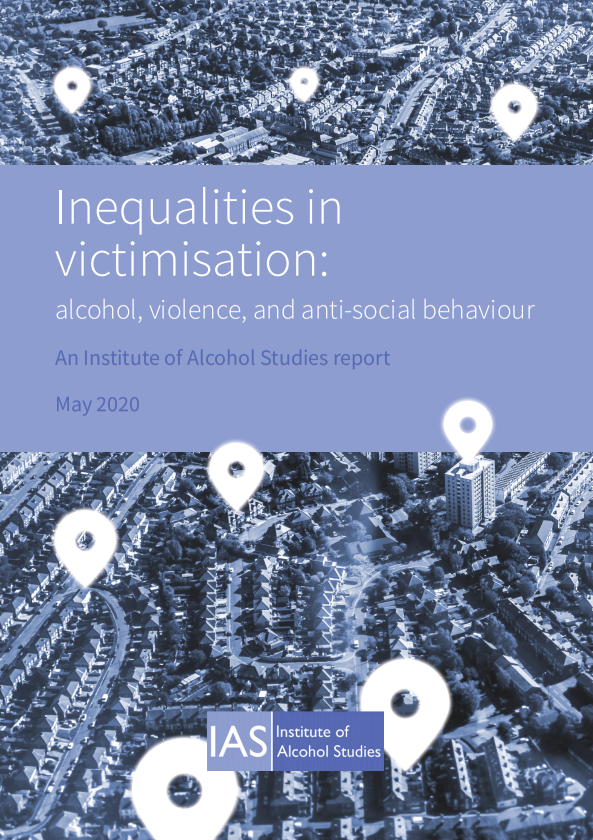A new report by the Institute of Alcohol Studies (IAS) and the University of Liverpool’s Department of Sociology, Social Policy and Criminology has found that alcohol-related violence affects the poorest in society to the greatest degree.*
According to the report titled “Inequalities in victimisation: alcohol, violence, and anti-social behaviour” there are stark differences regarding alcohol violence between different socioeconomic groups in England and Wales.
The researchers analyzed five years (2013/14 to 2017/18) of data from the Crime Survey for England and Wales (CSEW), and linked details of alcohol-related violence or anti-social behavior with information relating to victims’ occupation, income and housing tenure. Different types of alcohol related violence were analysed including domestic, stranger, and acquaintance violence.
According to the report,
- the most deprived groups experience up to 14 times more domestic violence compared to the least deprived groups;
- lower socioeconomic groups, with the most deprived groups experienced up to 7 times as many incidents of alcohol-related acquaintance violence every year compared with the most advantaged groups; and
- lower socioeconomic groups were also most likely to be on the receiving end of ‘high frequency’ alcohol-related anti-social behaviour in the last year – of those who experienced alcohol-related anti-social behaviour in the lowest socioeconomic groups (social renters, those unemployed, and those on the lowest incomes), as many as half were victims of this on a weekly basis.
These findings are especially important considering the reports of increased (alcohol-fueled) domestic violence during the COVID-19 period.

In terms of alcohol-related anti-social behavior (ASB) the study found lower socio-economic groups had more high frequency experiences of alcohol-related ASB victimization.
50.4% of social renters, 46% of households earning less than £19,999 and 55.1% of unemployed people were suffering weekly from alcohol-related ASB; compared to 28.4% for homeowners, 24,7% for those earning £40,000 and above and 27.9% for those in managerial positions.
This research clearly shows that those belonging to lower socio-economic groups are more likely to experience alcohol-related violence than others,” said Dr. Carly Lightowlers, study author from University of Liverpool’s Department of Sociology, Social Policy and Criminology, as per University of Liverpool News.
However, when this violence was broken down into subtypes, it was alcohol-related domestic violence where the most dramatic inequalities were seen – incidence rates for this amongst the lowest socio-economic groups were as much as 14 times higher than for others.”
Dr. Carly Lightowlers, University of Liverpool’s Department of Sociology, Social Policy and Criminology, and Study author
Other findings of the report are:
- Overall, households earning less than £19,999 were over 50% more likely to suffer some form of alcohol-related violence than those earning £40,000 and above (1.07% against 0.78%).
- Those classed as long-term unemployed were almost twice as likely to be victims as those in managerial occupations (1.01% against 0.64%).
- For alcohol-related domestic violence, social renters had an incidence rate (12.13 incidents per 1,000 people) over 14 times higher than that for homeowners (0.85 incidents per 1,000 people).
Alcohol-related violence accounts for two fifths of all violence in England and Wales today, and it is the most deprived groups bearing this burden to the greatest extent,” said Lucy Bryant, study author and Research and Policy Officer at the Institute of Alcohol Studies, as per IAS.
It is vitally important policymakers take action to address not only this disparity in victimisation, but the structural drivers that lie behind it.”
Lucy Bryant, study author and Research and Policy Officer, Institute of Alcohol Studies
The report calls for the removal of barriers to support services for those from the most deprived communities, including substantial improvements to the provision of publicly funded domestic violence services, and for the availability across the population of alcohol treatment services, alcohol interventions in primary care and emergency services settings.
It also recommends investigating population level pricing interventions – such as minimum unit pricing – for its potential to disproportionately benefit the most deprived groups.
In jurisdictions such as Scotland and Wales, MUP is doing exactly what it is supposed to which is reducing alcohol harm against those in lower socio-economic standing and those with heavy alcohol use problems. MUP also acted as protective factor in Scotland against the increased harm caused by alcohol tax cuts in the UK.
Our findings suggest the potential of alcohol pricing and availability interventions to disproportionately benefit lower socioeconomic groups should be urgently investigated by policymakers and researchers,” said Dr. Lightowlers, as per University of Liverpool News.
Dr. Carly Lightowlers, study author, University of Liverpool’s Department of Sociology, Social Policy and Criminology
*Note:
This story has first been published on May 23, 2020 but has been republished after an update with the news from Liverpool University on November 5.
For further reading
Download the report here (PDF).